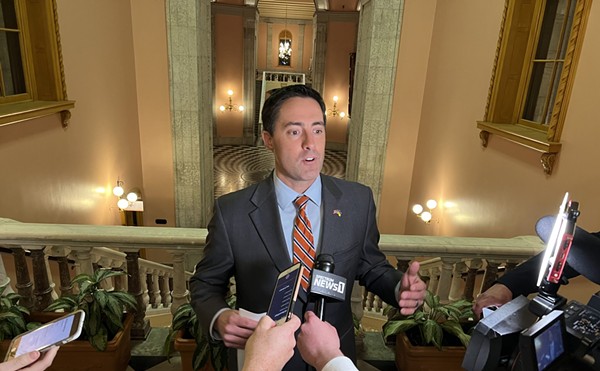A proposed change to the Cleveland-Cuyahoga County Port Authority's prevailing wage policy will hurt workers and their families, says the Prevailing Wage Coalition, a group of organizations dedicated to fair compensation, workers' rights and economic equity.
“Only in a world where down is up and up is down would a diversity, equity and inclusion (DEI) consultant suggest the path to creating a more equitable region is best charted by reducing worker wages, jettisoning the Port’s prevailing wage requirement,” the group wrote in a letter to president and CEO William Friedman.
A Port resolution has required prevailing wages and a $15 minimum wage for service sector contracts since 2018. A prevailing wage is a common feature of unions and is defined as “the average wage paid to similarly employed workers in a specific occupation in the area of intended employment,” according to the Department of Labor.
The letter comes after Bridges Group International, a North Carolina-based consulting firm the Port brought on to create DEI initiatives, told the board of directors the prevailing wage resolution harms the port’s ability to finance deals.
Consultant Renee Holloman told the board that, according to her interviews with stakeholders, "the 100% prevailing wage requirement has had a total chilling effect for some people who would bring in requests for funding to the port.”
Holloman recommended getting rid of the prevailing wage mandate so the port could finance more development projects, ultimately increasing revenue which could then be put back into DEI programs.
Senior vice president of Public Affairs and Energy Policy Jade Davis stressed that the minimum wage would remain at $15 an hour and that any potential change to the prevailing wage mandate “still does not change prevailing wage on port projects or projects that the port is spending port money on, like Irishtown Bend.”
“This wouldn't cover unionized labor and things like that. This will probably cover more ancillary and third party services,” like couriering and minor cleanup, Davis said.
One of the ways the port makes revenue is through fees from its bond financing program, which helps smaller organizations borrow money at good rates. According to Crain’s, Cleveland’s port currently has nine bonds, far less than Columbus's 45, Cincinnati’s 37 and Summit County’s 27.
With fewer deals, Cleveland’s port is in danger of getting a lower bond rating from Standard & Poor's (S&P), a leading stock market index.
"Without an 'A' or above rating, essentially we're out of business and can't fund anyone," the port’s vice president of development and finance Rhonda Winslow told Crain’s. "We've been given kind of a warning from S&P that we need to get more deals done, more transactions done and build the number back up in the program, or we run the risk of being degraded."
But the Prevailing Wage Coalition says the current resolution is vital for workers
“Growing economic inequality – both income and wealth – was caused by intentional policy decisions over the past four decades,” the letter says. “This is precisely why the Port’s 2018 resolution to require prevailing wages and a minimum hourly rate of $15 per hour for service contracts for Port financed projects was an important step in the right direction. But it was exactly that – a step.”
The letter is signed by two dozen organizations focused on fair compensation and workers’ rights, like End Poverty Now, Cleveland Jobs with Justice and the Ohio Working Families Party.
Although the money put towards DEI projects would fund programs designed to benefit underserved communities, trade educations and businesses owned by minorities and women, the coalition’s letter cites the fact that “often Black and brown workers are most adversely impacted by both the historic and accelerating economic inequality in our economy” as a reason not to implement said changes.
The coalition also points out that, for such a significant change, voters weren’t informed last November.
“It is surprising to see the Port consider this major policy change immediately on the heels of a successful levy campaign. Interestingly, this significant policy change was never identified as a consideration of the Port to voters this past November,” the coalition’s letter says. “Voters would have likely responded differently to the levy had they known that the Port intended to prioritize the reduction of worker wages.”
The letter in its entirety can be read below:
Dear President and CEO Friedman:
Only in a world where down is up and up is down would a diversity, equity and inclusion (DEI) consultant suggest the path to creating a more equitable region is best charted by reducing worker wages, jettisoning the Port’s prevailing wage requirement.
Growing economic inequality – both income and wealth – was caused by intentional policy decisions over the past four decades. This is precisely why the Port’s 2018 resolution to require prevailing wages and a minimum hourly rate of $15 per hour for service contracts for Port financed projects was an important step in the right direction. But it was exactly that – a step.
More work must be done to ensure that workers in our region earn family sustaining wages. Too often Black and brown workers are most adversely impacted by both the historic and accelerating economic inequality in our economy. The Port must be a partner in this work.
Consequently, we were surprised to see what appears to be a significant change in your position on the Port’s investment in family wage jobs. Following passage of the 2018 resolution, you provided the following comment to Crain’s Cleveland: “I think it is widely acknowledged as a problem in Cleveland that ... access to jobs and the benefits of the port-related economy and other sectors of the economy aren’t always shared as broadly as they should be. This is our way of trying to address that,” In sharp contrast, your most recent Crain’s comment provided: "We could potentially generate some more fees in the process and then plow that back into our DEI initiatives," said Will Friedman, the port's president and CEO.
We oppose in the strongest possible terms any change to the 2018 Port resolution requiring prevailing wages and a minimum of $15 per hour rate for service sector contracts.
Finally, it is surprising to see the Port consider this major policy change immediately on the heels of a successful levy campaign. Interestingly, this significant policy change was never identified as a consideration of the Port to voters this past November. Voters would have likely responded differently to the levy had they known that the Port intended to prioritize the reduction of worker wages.
Sincerely,
Asian Pacific American Labor Alliance, AFL-CIO; A Better Cleveland for All; End Poverty Now; Local 1 SEIU; Starbucks Cleveland Workers United; InterReligious Task Force on Central America & Colombia; Teamsters Local Union No. 507; Cleveland Jobs with Justice; Our Revolution Ohio; Cleveland Owns; OPEIU Local 1794; Unite Here Local 24; Clevelanders for Public Transit; Organize Ohio; Workers United Chicago & Midwest Regional Joint Board; Cuyahoga County Progressive Caucus; DSA Cleveland Steering Commission; Northeast Ohio Coalition for the Homeless; Ohio Working Families Party; Northeast Ohio Working Center; and Young Latino Network.
Coming soon: Cleveland Scene Daily newsletter. We’ll send you a handful of interesting Cleveland stories every morning. Subscribe now to not miss a thing.
Follow us: Google News | NewsBreak | Instagram | Facebook | Twitter












